#such an evil invasion full of the same kinds of evil as nazis should not be ignored.
Explore tagged Tumblr posts
Text
It's funny how people don't recognize in the present events that are similar to those that happened in history. They are horrified by the atrocities in history, but somehow seeing similar ones now-- they ignore. Turn away as too "difficult". As if these people facing the same things now don't need help much more than the people from the past, because those events are long over. Or it's as if seeing through the framing of news and the lens of social media makes it less real somehow. Like it's not official if it's not in history books-- even though these are real flesh and blood people and it's happening before our eyes and it's NOT just entertainment to passively consume. People may be inspired by heroes of history, such as the resistance during World War II and the Holocaust, while they ignore the ones fighting evil that is viciously active right now. They cannot see the evil thats blatantly staring them in the face, daring them to do something, say something. Anything other than ignore it.
#do something could mean words#words travel#ukraine#war#russia#its not just “over there#catch it before it spreads#LOOK AT IT#the conflict of our time#mass suffering.#sorrt but we should all care about this.#such an evil invasion full of the same kinds of evil as nazis should not be ignored.#light in darkness#admire resistance#usa take note#freedom justice life#love#those eho dont learn from history#bc we dont see the present as part of history!#the only thing necessary for evil to triumph is for good men to do nothing#i mean by this is that evil wants us to ignore#what russia did in syria and chechnya...#georgia#must fight evil wherever we see#if its massive all should be involved in a way#your own corner also#and. perhaps other areas that need help.#so much.#we all should do something and not be so distracted by shallow trivialities
4 notes
·
View notes
Text
‘What does death represent to the individual?’ – Melanie Klein’s response to a letter from Joan Riviere, 3rd June 1940
8th November 2018


This month I am posting a couple of wartime letters, which I thought appropriate on the 100th anniversary of Armistice Day, 11th November 1918.
Folder C.96 in Melanie Klein’s archive consists of ten pages, including a two-page letter written by Joan Riviere to Klein on 3rd June 1940. In this letter Riviere asks Klein to lay out some of her thoughts on the ongoing war, and the psychological ‘causes’ behind such destructive conflict. This exchange – saturated with anxiety about the worsening situation – took place at a moment when the UK was under real threat of Nazi invasion and when, as Riviere says, ‘the possibility of our work all coming to an end seems so near’.
Riviere‘s letter is handwritten, while Klein’s response (undated, presumably written not long after Riviere‘s) is typed. No record remains of the list of questions suggested by Riviere to Klein. I have given Riviere‘s letter in full, but in the case of Klein’s notes I have done some minor editing for clarity’s sake. Her text was clearly not meant to be read out exactly as it was written down. Rather, it resembles a series of notes, a kind of aide-memoire for her talk, to which Riviere refers in her letter. It is unclear as to whether this talk was ever given, as Klein left London for Pitlochry at the end of June 1940; like many of her colleagues, she temporarily relocated to avoid the heavy bombing of London.
The majority of this fragment from the Klein archive has, in fact, previously been published by Claudia Frank (2003), but only in German. An English translation of Frank’s paper will appear as part of a collection of materials from the Klein archive, to be published by Routledge in 2019 (Jane Milton, in preparation). Meanwhile, Michal Shapira (2013) has written about Klein’s concept of ‘the Hitler inside us’ during the Second World War, and is currently preparing another book about Klein, based on archival material from this period (to be published by Cambridge University Press). The letter from Joan Riviere appears in a new biography by Marion Bower (2018).
Below is the letter from Joan Riviere:
Harefield (4 Stanhope Terrace, W.2) June 3. 1940
My dear Melanie
When the first official mention of invasion began, the possibility of our work all coming to an end seemed so near. I felt we should all have to keep it in our hearts, perhaps, as the only way to save it for the future. Also of course I was constantly thinking of the psychological causes of such terrible loss and destruction as may happen to mankind. So I had the idea of your telling me (and then a group of us) everything you think about these causes, so that all of us who can understand these things at all should share and know as much as possible, to help to preserve it.
My idea is that you should tell us first what you believe to be the causes 1) of the German psychological situation, and 2) Secondly of that of the rest of Europe and mainly the Allies, since the last war. To me the apathy and denial of danger in the Allies especially England is not clear (I never shared it). 3) How is it connected with what I call the ‘Munich’ complex – the son’s incapacity to fight for mother and country, and his homosexual leanings.
These are the sort of questions I wanted you to speak of. I thought we would have no discussion – the only questions should be to get your meaning clear. I asked people to send in questions beforehand, which I can probably arrange in some order and bring up at a moment when you are dealing with that kind of point. If there is time I would send you the points before. Do you go to 9 Manchester Square on Saturday before the meeting? Or where will you be?
I shall be in the country till some time in the afternoon, then at home until about 6.45.
Thank you very much for your letter of 24th May. It is a good thing you have sent your papers abroad. But I believe we shall pull through, all of us, including you!
I am so looking forward to Saturday – psa [psychoanalysis] is a great anodyne in all this anxiety!
With much love
Yours ever
Joan.
In the margin is written an additional question:
4) One great question is why is it so important to be able to be brave and to be able to bear whatever happens? Everything in reality depends on this. I see a lot of answers but I don’t feel I see all it implies.
The reply from Klein:
What does death represent to the individual?
The increasing danger of a terrifying death brings out in individuals both the deeper reasons of their fear of death as well as their methods of combating this fear. Instances A. patient of very religious upbringing in whom the fear of Hell had played a great part in childhood, a fear which had intellectually been entirely overcome is revived in the present situation. The internal hell which could not be overcome by love as demanded by religion because devil and helpful God were so very much the same in his unconscious mind. In this case and others it became clear that terror of own destructiveness and murderousness, fear of having arranged for Hitler to destroy the world, and especially the incapacity to dissociate the evil father and parents from the good ones, to dissociate love from hate, and therefore to turn hatred against the evil thing – love and protection towards the loved and good people – that all this has a paralysing effect in the relation to external dangers.
One conclusion a) An important step in development is the capacity to allow oneself to split the imagos into good and bad ones which goes with the capacity to trust one’s constructive tendencies and love feelings. Only thus is it possible to hate with full strength what is felt to be evil in the external world – to attack and destroy at the same time protecting oneself with one’s good internal objects as well as external loved objects, country etc, against the bad things. To be able to achieve this is also dependent on b) The relative strength of internalized relations versus external ones – or rather the balance between internal situations and relations on the one hand and externals on the other.
If the feeling that external war is really going on inside – if the feeling that an internal Hitler is fought inside by a Hitler-like subject – predominates, then despair results. It is impossible to fight this war, because in the internal situation catastrophe is bound to be the end of it. This depends also on the ways and means in which the subject is carrying out the internal war. If he feels to out-Hitler Hitler, then it will all end in complete destruction inside. If there is a better balance between internal happenings and external happenings and the war inside is not predominating, then one can turn with strength and determination against the external enemy. There are many other factors at work which all work towards greater trust in one’s own capacity to love and construct as well in the good object and determining the balance between internal and external.
I see fully confirmed former experiences that death is terrifying to the utmost, if trust in internal relationships is weak. The danger may then be denied (very important in the general attitude towards the Hitler danger – Chamberlain’s remark of war as a nightmare) or the individual becomes paralysed – which may amount to suicidal incapacity to deal with external dangers, and ultimately (paralysis of) the means of destroying the dangerous Hitler inside. I have seen in this present situation patients’ courage grow, depression diminish, and their capacity to make decisions etc increase when hatred and guilt connected with early phantasies had been further analysed. Present situation provides a very strong stimulus to revive the guilt and fears connected with these phantasies, and I have been struck with the effect analysis can have in such conditions. Pressure of anxiety helped to throw light on former material and was able to remove much anxiety and despair.
One very typical thing was the guilt about the attraction towards this, to the destructive and dangerous penis which Hitler’s murderous weapons represent. In men it appeared that quite hidden passive homosexual phantasies, plotting and scheming with the destructive father, came to the fore. a) They had instigated Hitler to this destructive intercourse and enjoyed it sadistically. b) Terror of being destroyed and identification with the threatened mother reinforced the tendencies to scheme and plot with the dangerous father. To this is added the anxiety of the internal destruction by this dangerous father who becomes more and more internal the more external reality proves his dangerousness. The guilt about the sadistic alliance with the dangerous father is one important reason for denial: but I see the most various methods used against it; for instance, very rational sounding views that we should continuously concentrate on the offensive expressed the drive towards active and dangerous homosexuality as a reaction against the desire and fear of being anally penetrated.
This feeling of a continuous thrust on the enemy to prevent him from invasion, in contradiction to that, that we should preserve through our thrust France’s destruction and rather allow him the invasion of England. (The mother was to be saved, England, representing more the patient himself, should be more allowed to be invaded). But here the jealous attitude of mother also found expression. There was also the wish to be anally penetrated by this impressive father as well as the desire to test in reality the dangerous threatening experience. With women too, the attraction towards the dangerous father, conspiracy against mother, guilt and punishment, were very much revived. Fifth column tendencies/phantasies and guilt. But it is interesting to find the connection between these sexual phantasies, the sadistic pleasure as experience in masturbation, and inner relations. Interaction between distrust and guilt relating to brothers, sisters and parents because of these sadistic conspiracies and relations to internal objects. In the (reduced) capacity to trust in the preservation of internal loved objects because of these sadistic phantasies in relation to external ones.
Striking how the analysis of these secret plotting sadistic phantasies improved internal relationships and relieved anxiety of danger of present situation. In one instance, much former material became so much clearer and illuminating that peace of mind steadily increased, in spite of the worsening of the external situation. Balance between love and hatred increased, parents become in retrospect much more trustworthy, worthwhile preserving, and accordingly also present relatives. Fear of death decreased when trust in me, in analysis, and more generally in the survival of goodness in spite of all dangers to values, increased. The feeling that goodness cannot ultimately be exterminated, which may be a denial of danger in external relations, was based on a better balance between facing danger and yet relying more on internal goodness and trust in some good object.
The question of balance so often stressed appears as the ultimate decisive factor. Optimum between external and internal, love and hate, and the methods used against anxiety. Certain amount of temporary denial obviously unavoidable and necessary. We look at nature, we read a book, we play with a child, we enjoy food, etc, and we have to remind ourselves that our life and country is at stake. In between the good experience has helped us to deny the danger. If the denial predominates in the attitude it may lead to complacency, flight to the good inner objects, etc. If the help provided by the fact that such good things we just enjoy exist, the belief in the good object and in goodness ultimately, is not too much denial of the bad things, it may help us to take steps to preserve goodness externally, and may internally help us to remain calm in the face of danger.
After giving some fragmentary examples, which are in note form and not fully coherent, Klein turns to ‘technique’:
TECHNIQUE
The satisfaction we must all derive from the fact that analysis can be so helpful in these circumstances. There is confirmation about the main principles of our work; even now reassurance does not seem to be of great value (certain exceptions and rather limited). But an undisturbed keeping or holding fast to analyse aggression, guilt, which disturbs the belief in constructive and reparative tendencies, seems most helpful. We must however remain aware of the interplay, present and external situations, with internal and with the past, as well as past experiences. The strength with which certain experiences are re experienced, the details of phantasies coming up under this pressure, indicates also the great wish of the patient to cooperate with the analyst, and thus also to help the parent to improve the relationship with him, and to establish internally and externally, harmony. This strength of experiencing and bringing forward material has also to do with the stimulus which the nearness of death provides in experiencing life. Instances for taking in much more strongly beauty of nature, love in relations, etc, even lessening of certain inhibitions as seen in several cases. It is filling oneself with life, as well as sharing love with external people, and thus reviving, restoring internal situations. Also proof for goodness remaining; because ultimately in the future there will be objects to experience this and thus death as utter destruction cannot be true.
References
Bower, Marion (2018). The Life and Work of Joan Riviere: Freud, Klein and Female Sexuality. London: Routledge.
Frank, Claudia (2003) Zu Melanie Kleins zeitgenössischer Bezugnahme auf Hitler und den Zweiten Weltkrieg in ihren Behandlungen. [On Melanie Klein’s contemporary references to Hitler and the second world war in her treatment] Psyche – Z Psychoanal., 57:708-728.
Milton, Jane (in preparation) working title: From the Klein Archive; Essential Readings. London: Routledge. To be published in 2019/20.
Shapira, Michal (2013) The War Inside: Psychoanalysis, Total War, and the Making of the Democratic Self in Postwar Britain. Cambridge: Cambridge University Press.
#Melanie Klein#joan riviere#psychoanalysis#second world war#conflict#anxiety#fear of death#the blitz#nightmare of war#internal conflict#unconscious phantasy
3 notes
·
View notes
Text
asukaskerian
asukaskerian ...
sure, yes! :D what even is the plot like?
OKAY, SO.
Young Avengers can be split up, roughly, into five sections:
Volume 1, Part 1
Volume 1, Part 2
The Events (Civil War, Secret Invasion, and Dark Reign)
Children’s Crusade
Volume 2
Most of the cast has appearances in other things, but the main plot can be summed up as the above.
And now under the cut. I am verbose. Sorry.
V1 Pt1
Nate Richards, in the 31st century, finds out that he’s destined to become Kang the Conqueror, a time-travelling supervillain.
He comes back in time to the current era (or, well, 2005-ish), in an attempt to get some help and Not Go Evil.
He gets brushed aside by all the real Avengers, but finds the Vision’s corpse in a destroyed Avengers Mansion, and comes across the Avengers Failsafe Program. If they were to ever need a back-up team, then this was it!
The results aren’t meant to be just teenagers, but they’re what Nate finds. He calls himself Iron Lad, fashioning himself after Iron Man, reconstructing Vision partway to use the bot as armor. His new friends are:
Billy Kaplan, who calls himself Asgardian. He later switches to calling himself Wiccan, because being a gay superhero whose name is Asgardian would get him ripped to shreds by the media. It initially seems like his powers are electricity and flight, but it turns out he’s a reality warper.
Teddy Altman, who calls himself Hulkling. He’s a shapeshifter who can take on a Hulk-like form, though he keeps his wits about him.
Eli Bradley, who calls himself Patriot (after Bucky Barnes’ original alter ego, I think), a supersoldier whose grandfather was Isaiah Bradley, aka the Black Captain America. Isaiah was either one of the few survivors of the rounds of testing that the Serum underwent before Steve Rogers took it, or he was one of the few survivors of the experiments to recreate it after Steve went down, depending on the backstory. Either way, Eli’s got a chip on his shoulder about how African-Americans are treated by the government, including a short issue where he’s mentioned giving a school presentation on the Tuskegee experiments.
They try to do some superheroics, with varying results. The newspapers dub them the Young Avengers, and Jessica Jones, a reporter at the time, goes looking into them.
They try to save a church full of wedding guests, because the happy couple is Very Rich and everyone’s getting held hostage. They set the place on fire by accident, and have to be helped out by one of the bridesmaids. It’s not a great night for them.
Bridesmaid’s name is Kate Bishop! She doesn’t have a superhero identity yet, but she’s pretty good in a fight, and she’s the one that Cassie Lang finds.
Kate and Cassie find the boys at Avengers Mansion, and get the backstory. Cassie finds out that all the Pym Particles she was stealing from her dad (Scott Lang, one of several people to be Ant-Man) since she was in the single digits? They actually gave her superpowers. She can change size. Yay!
There’s a great big kerfuffle as Kang (Nate’s evil future self) and the actual Avengers show up. Jessica Jones ends up un-pregnanted for a bit as time threatens to collapse in on itself because of the stress it’s undergoing.
Billy’s reality-warping abilities are revealed, and he accidentally saves the day, but does not save Nate. Poor Nate.
He and Cassie kissed at some point. It’s not very relevant.
Vision is now a person! Not the same Vision you know and love, though. This one’s brain waves are based on Nate. His name is Jonas. I love him.
He ends up falling in love with Cassie because of this. This is relevant, but not for a while.
He also isn’t part of the team yet.
The adult Avengers tell them to stop superheroing, because they’re kids and not ready for this.
The kids don’t listen. They’re a Team Now.
V1 Pt2
There’s an entire “Eli’s not actually a supersoldier like his grandfather, so he takes Mutant Growth Hormone the way a normal person would take speed so he can temporarily have superpowers and it’s killing him slowly” plotline that I’m not a fan of. I’m really not a fan of the black kid getting the drug plotline. Yech.
He leaves the team for a while.
Kate is an heiress, so she’s bankrolling the team. Fuck yeah.
Also she’s calling herself Hawkeye by this point. Cassie is Stature.
Less Fuck Yeah is the fact that aliens are showing up. Why are aliens showing up? Because Teddy’s an alien.
Turns out his mom was the Skrull princess, and he’s heir to the throne of an alien empire. (His inheritance is bigger than Kate’s.)
Skrulls are natural shape-shifters, hence Teddy’s powers.
His dad was Captain Mar-Vell of the Kree empire.
The Kree and Skrull usually hate each other. Mar-Vell seduced Princess Anelle while he and some other Avengers were imprisoned by her father, in fact. It was very soap opera.
Both of these people are dead, and Teddy was raised by a nurse that Anelle had entrusted him to.
Teddy’s adoptive mom gets burned alive. And then not-alive. Teddy is understandably traumatized by the fact that he’s an alien and that his mom was just murdered by the guy that came to steal him away.
Teddy gets kidnapped. Eli rejoins the team because, well, kidnapped.
BTW Jonas has been living at Avengers Mansion, playing chess and getting tested for sapience.
Edwin Jarvis tries to convince them to let the real, adult Avengers handle the kidnapping.
They nope and Jonas helps them find more Young Avengers. They go break a kid out of prison.
Kid’s a mutant, like Billy! Kid’s had trouble controlling the powers and destroyed some stuff, like Billy! Kid looks exactly like Billy, like... wait.
This is Tommy Shepherd. He blew up a school when his superspeed manifested, and got tossed into juvie as a result. He has white hair, but he and Billy are otherwise identical. This is relevant.
They go try to save Teddy, but even more aliens show up than just the One Guy (K’lrt, the Super Skrull) that kidnapped Teddy.
The Skrulls and Kree are about to fight a war over Manhattan because Teddy exists.
A few people suggest that Billy and Tommy are retroactive reincarnations of the Scarlet Witch’s dead kids. This is still relevant.
There’s a big fight, but not a war.
Eli gets shot.
K’lrt has a change of heart and shapeshifts into Teddy and replaces him so that the aliens leave.
Eli gets a blood transfusion from Steve Rogers himself. He’s a real supersoldier now!
They get commended for their actions. Now they really ARE a team, and if someone says V1 team, it’s gonna be these seven: Billy, Teddy, Kate, Cassie, Eli, Tommy, Jonas.
Sometimes Jonas gets swapped out for Nate.
I get sad.
The Events
Civil War was about Tony Stark and Steve Rogers fighting about government oversight. It was more complicated than the movie.
Most of the YA are on Steve’s side. Cassie is on Tony’s.
They try to help the Runaways at one point.
Noh-Varr gets mind-controlled into trying to kill them.
Noh’s life is an endless clusterfuck.
They all almost kill each other, there’s a kind of queerphobic kidnapping (it’s focused on mutants and aliens, but the mutant is gay, two of the aliens are gay, and one of the aliens is genderfluid), and there’s torture of minors.
On the bright side we get to see Tommy being a Big Bro Friend to a twelve-year-old with super-strenghth, so that’s fun.
Secret Invasion is basically about the Skrulls being Everywhere.
They run into the Runaways again.
They fight some aliens.
Teddy almost gets kidnapped again?
This is not the last time Teddy gets kidnapped or even just almost kidnapped.
He should work on that.
Tommy’s powers get a panel that heavily indicate some Science that I once nerded out about for a while.
IDK it’s drawn manga-style and they all fight alien assassins and it’s fun.
Dark Reign was about Norman Osborne taking over everything and being awful.
There’s an evil version of the Young Avengers running around, using their name.
They confront the new team.
The new team ranges from “artsy villain fangirl who found a magic coat” to “guy whose powers led to him accidentally murdering his parents and now he’s fucked up from it and trying to do good” to “girl woke up with powers one day and decided to lie to the world and pretend to be Asgardian” to “some guy who just really loves guns and killing people and styled himself after Punisher’s aesthetic with even less regard to human life” to a chick that’s just a straight-up Nazi with size-changing powers and a robot boyfriend that she’s constantly rewiring to make him a more awful person.
I fucking hate Big Zero. She’s a nazi and she’s awful.
I like Sylvie, though. I mean, she pretends to be something she’s not, and she flirts with a man who’s clearly taken and gay, even while she’s not single herself.
But like.
She’s fun and kinda dumb and I enjoy reading her.
Children’s Crusade
The Scarlet Witch has been missing for a few years.
After Billy’s powers go nuclear, he decides to go find her, because she’s his soul mom.
He brings the team.
(There’s a lot more going on because the Avengers all think Billy’s powers are going to go on the fritz and murder everyone.)
GRANDPA MAGNETO IS IN THIS ONE
I LOVE GRAMPNETO
HE’S NOT GOOD AT THIS GRANDPA THING BUT HE’S HERE
Also Pietro
He’s the worst uncle
He’s so bad with kids
I love him
They find Wanda but it turns out she’s a Doombot.
So they go to Castle Doom, and it turns out she’s amnesiac and about to marry Doctor Doom because he’s manipulating her into thinking he’s a good person.
Shit happens, she gets her memories back, and then there’s a big fight between the Avengers (who think Wanda and Billy are risks), the X-Men (who think similarly, but also are mad at the Avengers, and there’s a cool sequence where Wanda knocks out Emma Frost), and Doctor Doom, who’s trying to become God.
He kind of succeeds, and then fails.
Nate shows up.
Several people, including Cassie’s dad, get brought back from the dead, or are revealed to have never been dead in the first place.
Cassie dies.
Jonas is murdered by Nate.
Everything is awful.
The team splits up.
Only Tommy wants to keep being a hero.
Everything sucks, basically.
V2
I fucking love V2.
Kate and Noh-Varr hook up and she doesn’t even realize this is the guy who almost killed her that one time until the morning after.
They fight some Skrulls while flying around in orbit with Noh’s spaceship.
(We later find out that these are not Skrulls. They are shapeshifters who are Skrull Fanboys.)
Teddy’s been sneaking out at night (he lives with Billy’s family, since he’s an orphan now) to fight crime. Billy does not approve.
There’s a new girl called America Chavez. She’s important.
Loki is like... ten.
Billy tries to pull Teddy’s mom out of another universe, moments before her death.
It’s great!
Turns out she’s an interdimensional Eldritch Abomination that wants to eat their souls.
She can make adults oblivious to the fact that anything is wrong.
She can mind-control parents.
She can, in the right location, bring back DEAD PARENTS that she mind-controls to fight you for the ultimate trifecta of trauma.
She’s terrifying and I love her.
Anyway, Loki tries to help, almost gets used as a bartering chip with Asgard to get them to help instead since no one trusts Loki, and the team comes together!
Kate, Noh, Loki, America, Billy, Teddy
They have to fight a really big horde of mind-controlled parents.
Including their own undead superhero parents.
Loki actually helps!
They fly off to have fun fighting crime elsewhere until they can figure out how to avoid Mother more successfully, since they can’t really stay in New York right now.
They live on Noh’s spaceship.
It’s a nice spaceship.
(Irony of ironies, Loki was the one that pointed The Mother Parasite in Billy’s direction and planted the idea of saving Mrs. Altman into Billy’s mind in the first place. It was a whole Thing.)
TOMMY is not part of the team, because he cut himself off from basically everyone back in CC. I’m not actually sure anyone knew HOW to contact him at this point.
He goes on a date with a cute, superpowered coworker. Coworker’s name is David. He doesn’t actually HAVE superpowers anymore, but his superpower used to be knowledge absorption, and he remembers EVERYTHING.
EVERYTHING
You wanna know Wolverine’s preferred ass-wiping method? David knows. You wanna know how to do a one-time pad to encrypt data? David knows. You want Emma Frost’s bra size? He knows, but he’s not going to tell you, because she’s terrifying.
I love David.
There’s some horrifying Thing wearing Eli’s old costume running around and doing weird illegal shit so Tommy and David investigate.
Tommy gets kidnapped for a bit.
David gets the Young Avengers to help him save Tommy.
It’s awesome, mostly.
Teddy and Billy take a break, and Teddy’s new therapist is Leah of Hel.
I love Leah.
There’s a support group for exes of superpowered people who got fucked over by that whole nonsense.
All three of Noh’s exes are torn between wanting him back or wanting him dead.
Except Oubliette, who doesn’t see why she needs to choose.
America’s ex-teammate is mad that she’s a lesbian.
Patri-not is an Eldrith Being that kidnapped Tommy and we honestly still don’t know what it was.
It’s been SIX YEARS IN THE REAL WORLD AND I STILL DON’T KNOW WHAT IT IS
And Leah is Loki’s former best friend.
Teddy think’s they’re all nuts and tries to leave.
Take a guess what happens.
Take a guess.
If you guessed kidnapping, you’re right!
The support group is working with the Mother Parasite.
So now the team has to go rescue Teddy.
Loki gets aged up by way of Billy’s magic but it doesn’t help Loki get their magic back fully like they’d hoped.
So, fight.
It’s all very dramatic and they use David’s phone tree to get backup and there’s a lot of visual metaphor.
Billy becomes the Demiurge for a bit to erase Mother from existence. He’s basically god?
Noh dumps Kate for his ex.
It turns out all of the exes are figments of Loki’s imagination. His guilt over murdering his child self (back in Journey into Mystery) and possessing the body manifested itself externally, and the reason he lost so much of his magic was because he was subconsciously creating magical constructs like Leah and the League of Evil Exes.
Noh feels like a dumbass.
Loki disappears just as Billy’s introducing all of his friends to his parents.
Loki feels guilty as shit.
There’s a New Year’s party and everyone’s invited, including David’s phone tree.
Fun!
Turns out Loki bankrolled the party. They flirt with David for a bit.
I ship it, tbh.
Patri-not wasn’t actually a figment of Loki’s imagination. Patri-not is real, and an enigma, and still has Tommy.
David makes out with Patri-not and halfway through Patri-not turns into Tommy so. Tommy’s back!
WE STILL DON’T KNOW WHAT THE FUCK PATRI-NOT IS
YES I’M GENUINELY UPSET ABOUT THIS
There’s a joke at the end of the comic about how they’re all queer except Kate.
Hawkeye implies that she’s probably bi later on.
Loki never rejoins the team because GUILT.
Original Sins was a thing. Teddy, David, and Noh work together to save a bunch of stoners who are about to die from having a bunch of information downloaded directly into their brain when someone crushed a giant eyeball.
And everyone’s been doing their own thing since then.
Teddy really needs to stop getting kidnapped, tbh.
#asukaskerian#Young Avengers#Teddy Altman#Billy Kaplan#Kate Bishop#Eli Bradley#Jonas#Tommy Shepherd#Noh Varr#David Alleyne#America Chavez#Cassie Lang#Nate Richards
98 notes
·
View notes
Text
Crisis on Earth-X: Crossover’s Top Five MVPS
Number Five
Number Four
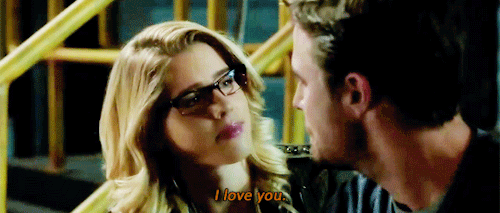
Yep, I’m counting Olicity as one person, because they’re MARRIED so I CAN.
Felicity has always been a hero in her own way. But Crisis on Earth-X saw her willing to die for Kara Danvers twice. And the best part? She looked scared as hell while doing it. Her hero counterparts always look calm when a gun or shaking hand that can rip their hearts out are pointed at them. Felicity looked terrified, but she still did it. And that was okay. It was so okay. It doesn’t mean that she’s less of a hero than them because she gets scared.
And how fantastic was it to see Felicity Smoak protecting Supergirl? To see her climbing through vents with Iris, making plans, kicking Nazi ass and taking down a spaceship? She was definitely an MVP of this crossover by herself and with the people she was working with, which was such a highlight because she kind of got pushed aside in last year’s crossover.
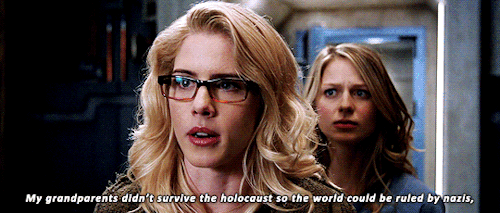
I cannot tell you how important Felicity Smoak and the special actress who plays her are. If you don’t get it by now, you probably never will. And that is your loss.
Anyway, Olicity.
I want to count them both as number four on this list, both individually and as a couple, because their relationship, them together is what made the crossover better. But they also did just fine on their own. Even when they weren’t in the same scene, or even on the same earth, they were always thinking about each other. We got so much of them this crossover, more than even Barry and Iris.
Oliver blew his cover because he couldn’t kill Earth-X Felicity. He didn’t know her, she wasn’t his Felicity, and it still wasn’t worth it to him. I don’t think that it was just that the girl was Felicity’s doppelganger, though. Oliver grows every season, and it is what makes Arrow so enjoyable. Watch the pilot again, I dare you. That guy doesn’t seem like the Oliver I’ve gotten used to on my screen lately at all.
I think Oliver’s empathy for Earth-X Felicity showed us his growth. He saved her because she’s innocent. Oliver’s moral compass may not be as righteous or perfect as Barry’s or Kara’s, but Arrow is a different show because of it. I don’t think that Barry and Oliver were every truly meant to be compared. They’re different kinds of heroes. Still, room full of evil Nazis be damned, Oliver couldn’t execute an innocent person just to keep his cover. He’d rather risk a shoot out.

I love that there was no evil Felicity. I can get on board with this idea. No matter what earth it is, every version you meet of Felicity Megan Smoak is going to be kind, brave, and selfless. I’m down for that. And it would have been even better if every version of Felicity somehow made Oliver into a better human being. But I’ll just block Nazis from my brain and go with that instead.
I did have one problem with the scene though. Oliver’s “the strong protect the weak” line was bullshit. Earth-X Felicity was living and surviving in a literal concentration camp. She was risking her life to feed starving children. She was not weak. How dare you call someone like her weak???
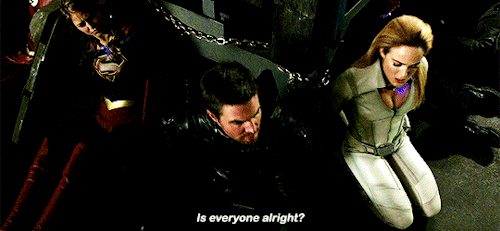
Since I talked about Felicity on her own, Oliver Queen deserves a little celebration too.
For starters; the one, and only thing that this Nazi invasion did was show that Oliver is better than Kara and Barry in a way. Kara kind of got off the hook, her evil twin was dying anyway, so she didn’t have to deal with the “to kill or not to kill” superhero stuff. Oliver and Barry both had to face the decision, though.
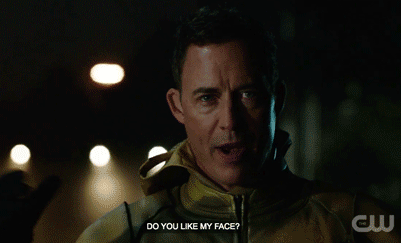
But Barry let’s Thawne go? With a stupid, cheesy, “see ya next time, my evil nemesis!” LAME. I get it, Barry doesn’t kill. But Thawne should have been an exception. I’m sick of him. It’s not interesting anymore. It’s not fun to watch. The story is old. I would have been more surprised if he was really dead than I was that he lived. That’s when you know you’ve exhaused a character. Get some new material. He needs to die and he needs to stay dead. Also, IF YOU ALIGN WITH NAZIS, YOU ARE A NAZI. Barry Allen literally let a powerful, murderous Nazi walk away. And it pissed me right the hell off. So you know what, fuck Barry.
But you know who didn’t hesitate to kill the evil Nazi that shared his face? Oliver Queen. He had the shot and he took it. I didn’t take that as, “well Oliver’s the only one okay with killing.” or “he didn’t have to.” I took that as, “Oliver knows when to kill and when not to kill. And he made the right choice.” He doesn’t have the abilities that Barry and Kara do, so giving Nazi Oliver a chance to live would have been a risk that Oliver wasn’t willing to take. Barry took that risk with Thawne, and it was stupid as fuuuuuck.
I love Oliver Queen, I really do. And I’m glad that the crossover didn’t overshadow him or the other “non-powers” players. They seemed like they were consciously writing the story to make sure that Oliver, Sara, and Alex weren’t just twiddling their thumbs or contributing to the plan, but they were also leaders.
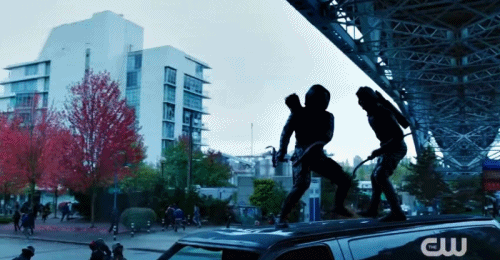
But anyway, Crisis on Earth-X gave time to Olicity that it didn’t last year and sure as hell hasn’t in a while. Season six scenes have been great, but we still haven’t seen them talk. They had a lot of baggage, and we assume that they worked it out, but we need to see it! That’s how TV shows work! So Crisis on Earth-X took some time to do it. That meant Felicity getting the chance to tell Oliver, and us, what she’s afraid of.
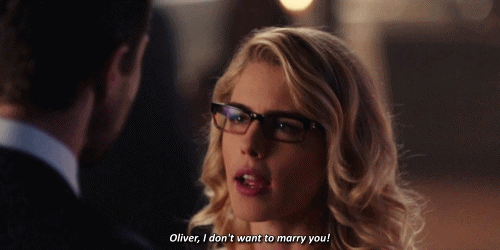
But she sooo wants to marry you. Honey is just scared, okay!? Honestly, the only unbelievable thing about this to me was that Oliver couldn’t guess why she didn’t want to marry him. She yells at him that she doesn’t want to marry him, but then they talk. She assures him that it’s not about him, because she loves him and wants to be in a committed relationship with him. She just doesn’t want the title of husband and wife.
She wants everything about marriage, just without calling it marriage. Oliver can be thick headed sometimes, but he’s not that dumb. Of course she’s afraid of something.
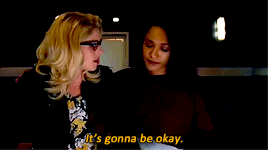
Unlike what we’ve seen in the past (SEASON FOUR) Felicity gets a scene where she tells Iris why she doesn’t want to be legally married to Oliver. And everything she says is valid and fair. Slow clap it out for Felicity Smoak, sharing and talking through her feelings with someone she trusts. Once you do that, it’s only a matter of time until you either talk to your person about it or you resolve the issue inside of you and move forward. She did that, finally, and it was wonderful.
Her explanation was something that I honestly hadn’t considered, which made it powerful and sweet. Felicity was shot and paralyzed on her engagement night. Then they broke up. The night they got engaged, as beautiful as it was, was extremely traumatizing for her. She associates the end of their relationship with the beginning of their lives as a married couple, because that night was when the train went off the rails and they couldn’t get it back.
She loves him so much, and she still wants the relationship with him, it’s just the public marriage and ring on her finger that scream bad signs to her. I loved being able to see this side of Felicity. I’m glad that they gave her the screen time to explain it.
And I’m so happy that we got to see this scene. Oliver Queen is moping. He just wants to marry his honey and give her kisses for the rest of his life but she’s scared and she’s not ready to tell him that yet and it’s hurting his feelings. Both of their responses and feelings were honest and understandable. They were kind to each other. They expressed themselves. Oliver was upset, but Felicity still made sure that he knew how much she loved him. And Oliver respected her choice and didn’t push it, even though he clearly still wasn’t satisfied with her answer. This is the kind of fighting I want to see.
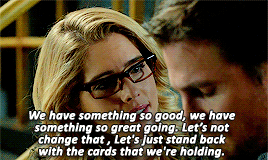
What I really loved about this though was that not only was it a fair fight, where they both had valid things to say, but we knew that they would resolve it. This fight had a clear beginning, middle, and end. The writers were not just throwing shit at us and seeing if Olicity would survive it. Which, isn’t that literally what they told us season four was going to be?
The Olicity arc in Crisis on Earth-X was well-paced, fair, and entertaining. What more could you ask for?
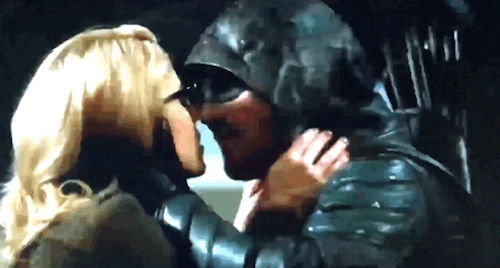
Okay yeah, Oliver kissing Felicity while in the Green Arrow suit was fantastic. I didn’t ask for that but fanfic dreams do come true.
Oh, a wedding?
WELL YOU GOT IT.
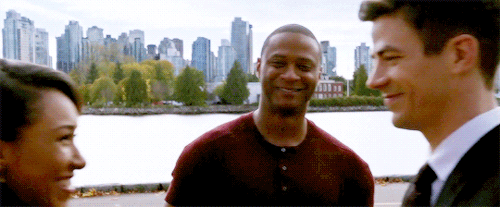
Congratulations, Olicity!
108 notes
·
View notes
Text
We Should Be Grateful Charlie Chaplin Made 'The Great Dictator' When He Did
Charlie Chaplin is understood to have confided to his friends that, had he known about the full horrors of the Nazi regime, he would probably not have got around to making The Great Dictator.
“There are things in our century that wipe away even the most poisonous smile from the face of the most passionate satirist,” wrote one of the 20th century’s foremost historians. He was referring to Karl Kraus, the great Austrian journalist-polemicist-satirist, whose book The Last Days of Mankind, written in the inter-war years, is a 20th-century classic. When it came to lampooning National Socialism and Adolf Hitler, Kraus says, “nothing occurs to me”. A little later, he adds: “The word fell asleep when that world awoke.”
When the Holocaust became common knowledge, Chaplin must have also felt that his craft was inadequate to render Hitler’s world in any known cinematic genre – political satire or vaudeville, burlesque or tragedy. The Great Dictator was conceptualised and filmed when it was still possible to make fun of the Fuehrer.
Chaplin started shooting for the film in September 1939, just days after Germany invaded Poland. But he had been planning a movie on Hitler for years before that, and worked on his script through 1938-39. From Nazi newsreels, he had carefully studied Hitler’s mannerisms and the way he harangued large crowds. Chaplin also watched Leni Riefenstahl’s propaganda documentary Triumph of the Will (1935) several times over to make sure that he knew Nazi rituals well enough; his incredible talent for mimicry did the rest.
The film shoot took a little over six months. By the time Chaplin sat down to edit and add the music tracks, Hitler was overrunning Belgium and Holland while France was gently nudging itself into surrender. When The Great Dictator released in the US in October 1940, London was being carpet-bombed by the Luftwaffe, Neville Chamberlain had already made way for Churchill as the British prime minister and Warsaw’s Jews were being herded into the first ghettos run by the Nazis. However, the tone of the film had already been set before the active hostilities began. A tragedy loomed clearly enough then, but few thought yet that it was the Armageddon.
This perspective is important for understanding the satirical and political scope of Chaplin’s film. The ‘final solution of the Jewish problem’ was not only in the future, it had perhaps not begun to take shape as yet in even the most malevolent Nazi sensibility. Chaplin had set out to spoof the pompous bully who was absurd and arrogant, but not yet quite the hideous hangman history was to know him as. Hitler still regarded Mussolini with something of the awe that the disciple reserves for his mentor – this gave Chaplin the opportunity to flesh out a memorable love-hate-love relationship – and Mussolini’s precipitous invasion of Greece, which annoyed Hitler no end, was not to happen before end-October 1940.
The Great Dictator can very well look a tad too light-hearted today; the fact that an uproariously funny story is being told around what can only be described as unmitigated evil can surprise its modern-day viewers. But it is undoubtedly a film true to its time.
And The Great Dictator is much more than a parody. It is a stirring denunciation of fascism’s core principles – xenophobia, intolerance, bigoted nationalism and anti-Semitism. It is funny, but its world is intrinsically violent. Hynkel is often nervous, even shy, but in the presence of his pretty secretary, his predatory instincts are aroused in a trice. Holding her in a tight embrace, he digs his teeth into her neck with sudden vehemence, the whole act looking more like the tearing of flesh than love-making. The utter casualness with which he gives up his prey when the telephone buzzes suddenly makes the scene even more chilling.
Writing in Criterion, Michael Wood notes the effortlessness with which Chaplin shows us “how lethal the ludicrous can be”:
Nothing in the film is quite as frightening as the sight and sound of the ludicrous Hynkel casually ordering the execution of three thousand striking workers.
Chaplin plays around marvellously with this crossover between rollicking humour and unmixed horror. Wood has pointed out how the harmless barber waving a razor over the bare throat of a customer looks more murderous than Hynkel ever does in the film. But the masterly mixing of the strains of Johannes Brahms’ ‘Hungarian Dance no 5’ into this edge-of-the-seat scene adds that piquancy which is signature Chaplin.
Again, as the barber sets out on his first date with Hannah, the storm-troopers arrive to get him. A long shot shows the SS men approaching the couple from one end of the street. The barber stops dead, turns around and heads in the other direction nonchalantly, as though nothing was the matter. Another long shot captures another SS column closing in on him from the other direction. Now in panic, the barber scrambles for safety, running first this way and then that, and the camera pans back a long distance before an aerial shot shows him being swept up by an avalanche of burly SS men.
As masterful as the casual mixing of horror and humour is the blending of the ridiculous and the sublime in The Great Dictator. Gracefully, even tenderly, Hynkel performs the unforgettable balloon-ballet with Wagner’s ‘Lohengrin’ playing softly on the soundtrack. But then he slips on to a tabletop, and goes on bouncing the globe-balloon off his behind, with loving care, a dreamy, enchanted look frozen on his face. When finally he tries to get both his arms around the balloon, it bursts with a scream in his face.
Again, as the fugitive Schultz plots Hynkel’s assassination while sheltering in the ghetto, a serio-comic drama plays out around a noble enterprise. Each of the ‘volunteers’ (Schultz smartly rules himself out right at the beginning) pledges himself to the great project, but is aghast when he finds the fateful coin in his pie. The scene soon turns into a boisterous farce.
The Nazis hated Chaplin, because they found his humour irreverent, subversive – hardly the kind that promoted the ‘wholesome family values’ so beloved of Hitler. In his 1931 trip to Berlin, Chaplin proved hugely popular in Germany and, though the Nazis did not like his spectacular success in all his public engagements, there was not much they could do at that point.
After Hitler rose to power, however, things changed dramatically for Chaplin, as they did for many other popular artists, German and non-German. In 1935, Goebbels banned The Gold Rush in Germany, presumably because the film ran counter to wholesome family entertainment. Even before that, in 1934, Goebbels had authorised the publication of a slanderous little book titled The Jews are Looking at You which, among other choice epithets, described Chaplin as “a disgusting Jewish acrobat” (Chaplin was not Jewish, though). Chaplin had seen the book, and it is safe to assume that his resolve to make a film around Nazism hardened because of it.
Given this background, he could hardly have chosen to play a part in the film that was non-Jewish. And Chaplin being Chaplin, he decided to deliver the coup de grace by playing Hitler as well. It must have been with grim satisfaction that he wrote into one of the opening credits of The Great Dictator words that dripped with irony: “Any resemblance between Hynkel the dictator and the Jewish barber is purely coincidental”. Of course, Chaplin wanted his audience to not look at the dictator and the barber through the same eyes. He expected the audience to laugh right through the film, but he hoped that while the viewers would laugh with the barber for the most part, they would laugh at Hynkel with derision, loathing and worse.
The Great Dictator represented another momentous event: it was Chaplin’s first ‘talkie’. (Modern Times in 1936 had a character screaming at people from a giant TV screen for a few moments, besides the inspired nonsense of the tramp’s song at the cabaret. But it remained a silent movie otherwise.) Chaplin seems to be exploring the enormous potential of his new ‘device’ with great relish here. Hynkel’s public speeches are pure genius. He speaks a mock German that bristles with coughs, sibilants, gutturals and splutters, with occasional identifiable words like sauerkraut (pickled cabbage) and schnitzel (fried meat slice) thrown in with gusto. It is pure gibberish delivered at an extremely, feverishly high pitch – so much so that the microphone itself cringes on its stem.
In another scene, Hynkel dictates an official note to a typist in a matter-of-fact manner. He is speaking aloud while she is taking it down on her typewriter. When Hynkel spouts a long, solemn sentence, she knocks out just a couple of letters. But when he offers only a monosyllable, she types furiously for several lines, clanging the machine as she works it intently. Hynkel looks on, amazed, but she remains completely unruffled, business-like. This playing-off of sound against meaning is an idea that could only have occurred to someone who was transitioning from silent to talking films, but it is hard to imagine anyone else picturising it as brilliantly as Chaplin.
The film’s last sequence, of the barber speaking as Hynkel to his victorious troops, is an audacious piece of cinematic thinking. The speech’s content is perched on the edge of mawkishness, and as it begins to crescendo, it sounds very nearly shrill. And yet, in the end, Chaplin pulls it off magnificently. The barber hesitates, approaches the microphone apprehensively, and begins speaking haltingly. As he does that, the frame slowly sheds its sharp focus, becomes somewhat bleary, over-exposed, fuzzy. As his speech gains in passion and force, the speaker himself is no longer very real himself, and as Hannah looks up to the sky, the screen is bathed in a soft, other-worldly light. This is neither Hynkel nor even the barber speaking here, but Chaplin himself stepping in to deliver his own message as the creator of the movie. Come to think of it, this could have been the only way The Great Dictator could have concluded.
For years before the film was made, cartoonists had exploited the quite remarkable resemblance of Chaplin’s moustache with Hitler’s. Chaplin was, of course, all too aware of it himself (which is why he thought of casting himself as the dictator). He knew that, with the minimum of effort, his face could be touched up to look like Hitler’s. And he also knew that the similarities stretched beyond their physiognomy: they were born within four days of each other – Chaplin on April 16, Hitler on 20, both in 1889; and both rose from poverty and neglect to power and prominence.
Did these similarities trouble Chaplin? Many believe they did, Chaplin’s own son telling us they actually haunted his father:
Dad could never think of Hitler except with a shudder, half of horror, half of fascination. “Just think,”’ he would say uneasily, “he’s the madman, I’m the comic. But it could have been the other way around.”
Of course Hitler was not only a madman. Nor was Chaplin merely a comic. But in The Great Dictator, the intersection of insanity and laughter produced a memorable movie. Chaplin says he couldn’t have made the film except in 1938-39. We are grateful that he made it when he did.
~
Anjan Basu · 16. Apr 2019.
1 note
·
View note
Text
Good Stuff - THE TROOF ABOUT STEVEN UNIVERSE - Part 2
WARNING: If anybody’s got a clown suitcase, I would very much like to see it. And here’s part 1, if you wish to know more. Thank you, take care out there, and enjoy.
Steven Universe is a charming, popular show with a quad-polar fandom, and I’m only here to point out what I say is legitimately wrong with the cartoon. Simple enough? Fair enough. Previously, I talked about how their action is so basic, it’s inexcusable. Now for Point number 2, which is also my favorite:
THE VILLAINS:

I fucking love villains. Not just for the who, but why and how they do it. When bad guys like the Joker, Lord Dominator, DIO, or Him do their thing onscreen, I enjoy every moment of their threatening essence (except Jared Leto’s Joker, he sucked). Villains remorselessly do unethical, downright vicious, things to fulfill their goals while initiating setting up the heroes to correct these effects with their efforts and abilities. Steven Universe has villains, sure. Yet, after having so many chances, Rebecca Sugardaddy has failed to make them REAL villains, specifically the Great Diamond Authority.
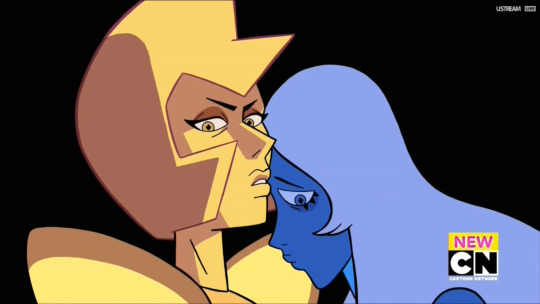
Now originally, I was gonna compare the Diamonds to the likes of Fire Lord Ozai (Avatar: The Last Airbender) or DIO (JJBA); villains that work in the shadows and when they’re eventually revealed, they’re already a force to be reckoned with. But looking into how they and Homeworld is set up, there was no other villainous ensemble that could stack up with the Diamonds perfectly like the Gorosei from the anime One Piece.
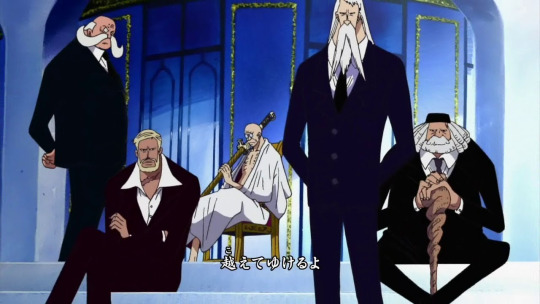
Looking more badass than the US Government
Now these five gentlemen aren’t necessarily what make up the end all be all for the series, but above all, the Gorosei are the ruling leaders of the organization that controls the entire world of One Piece. They command the military, the police, and other agencies, like their investigative and espionage departments, and the only people that out rule these gentlemen are the descendants of those who created it several centuries ago. Like the Diamonds, they seek to maintain order and justice for the people of their world and doing so means taking on any sign of revolution (namely Pirates) that could damage not only their image, but their purpose. Both Authorities possess absolute rule over the many classes that are under them and their stance of power can be present with the many actions that effect the characters we focus on currently. The difference between the two ruling classes is nuance, aka a grey sense of morality, aka an actual sense of relatability. So when I see a series having an overall narrative villain, Steven Universe has shown me that sympathy should NOT be a factor in storytelling.
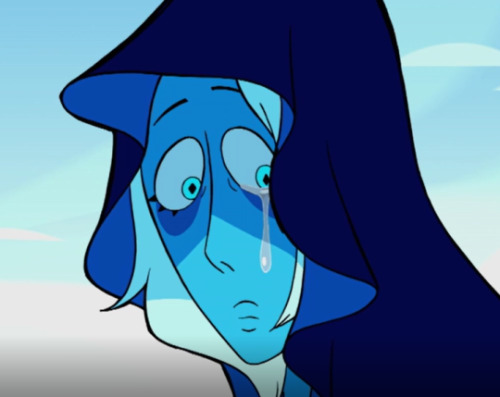
And their crocodile tears are not welcome either...
Now when I say this, I don’t mean you can’t sympathize with any villain you see. Most of the time, you can feel for the antagonist when their lives never were good to begin with, that’s namely how villainy starts out, therefore making their actions not so much justified, but understandable. Take the rogues gallery that are the enemies of Batman.
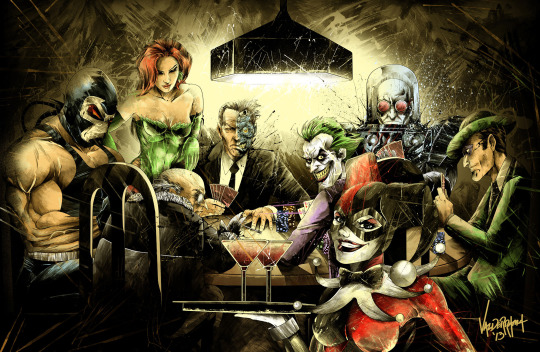
Every one of them has a story to tell and a method to their madness. Their histories weren’t as nice or as hopeful as they may have hoped, and you can feel their pain as their efforts to be successful at something grand falls apart due to the Dark Knight or life’s unforgiving nature. However, the sympathy stops there because none of these masterminds, with the Joker being an exception, serve as a main villain to Batman’s crusade for justice, they’re continuous rivals and one off stories that expand the DC Universe. No evil in Gotham is powerful enough because Batman’s story has no real endgame. Steven Universe and One Piece will eventually have an endgame. And while the Gorosei represent an Oligarchical commodity that separates its order seeking rule from their affiliating countries, The Diamonds have amounted to being under one system alone:
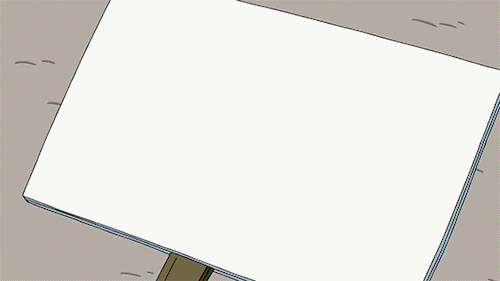
Yep. Nazis.
And it’s weird I bring this up. For I would’ve thought to have called Homeworld an authoritative caste system where the gem you’re born with defines your class and status, coinciding with the gems’ natural abilities. The specific gems are given a role and everyone plays a part to maintain societal order, like what India has, with the Diamonds being the biggest and strongest gems and therefore are the de facto Matriarch of the gem society, you feel me? That would’ve earned a little sympathy from me, because the Diamonds losing Pink would’ve meant the massive changes to accommodate their order and resources might not have worked out so well and their image as leaders are slowly diminishing and that can explain the huge resentment for Earth and Rose’s Rebellion.
But no. Instead the Diamonds are a repressive totalitarian government that basically control everyone and everything, all the gems below to strictly follow and almost never question their line of reasoning, and they’re reasons for destroying the Earth has been summarized down to the emotional baggage and grudge that came with their failure long ago.
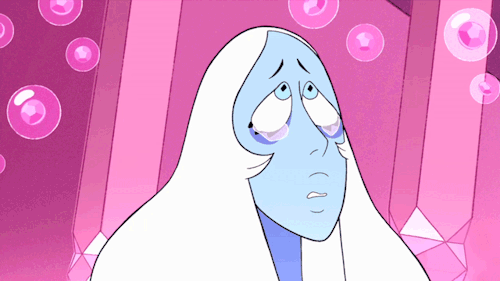
CAN YOU NOT FEEL THEIR PAIN?!
Wanna know why I didn’t compare the Diamonds to Avatar’s Fire Nation when talking about humanizing the enemy and the connection couldn’t be more obvious? Because before Ozai is ever mentioned, The Last Airbender states very clearly that the Fire Nation is the region Aang and his friends need to infiltrate to stop their manifest destiny. And when we’re early hinted that Zuko’s not full on evil, it lets the audience know that not everyone is on board with those in charge of the Fire Nation invasion, leading up to Ozai's big debut where we see that as the endgame villain, he’s irredeemable and has such a lust for power, that he’s recognizably the main drive everyone has to stop. Avatar did this right because little by little, the main enemy was narrowed down to a single force that hasn’t made itself known until near the end when his presence bear more importance. The same can’t be said for Steven Universe because Rebecca Sugar Rush presented yet another faint mistake.
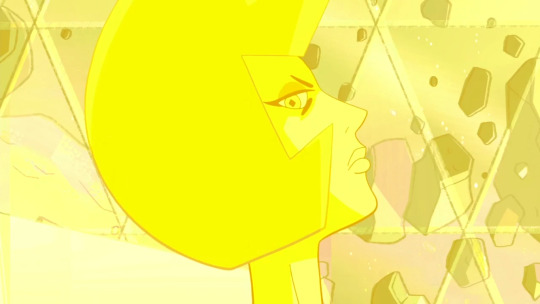
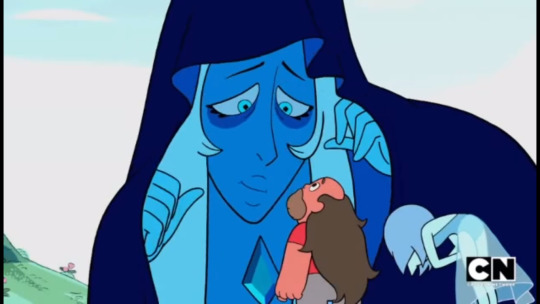
The Diamond’s personalities are given to us before they’ve shown us who they are and what they’re capable of...
So we see Yellow Diamond as a vindictive, no nonsense leader that wants shit to get done and Blue Diamond as a more tender looking, yet no nonsense leader that’s grieving over Pink Diamond’s death and does whatever she can to move on and remember the fallen fondly. So, have they done anything before we’ve met them personally? Sure.
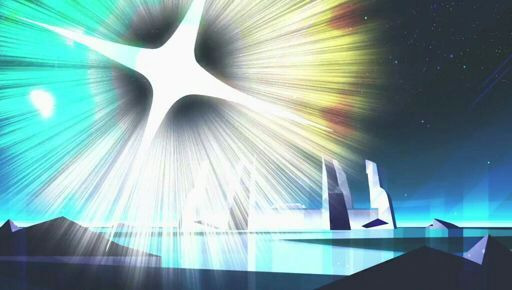
*They corrupted thousands of their own kind (because of the rebellion)
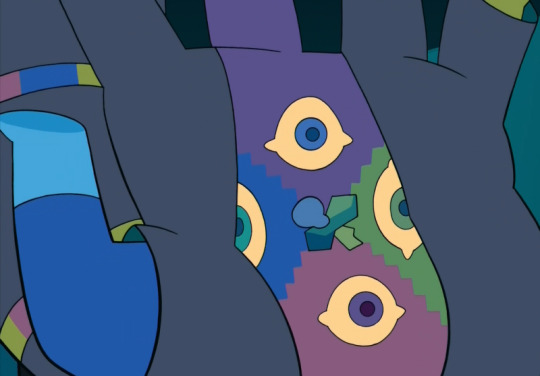
*Allowed experimentation towards shattered gems to make artificial fusion (because of the rebellion)

*Ordered a search and destroy on all “defective” gems that go against the Authority’s standards and prevalence while said defectives put themselves in a literally hole of despair for coming out wrong (Gaslighting)
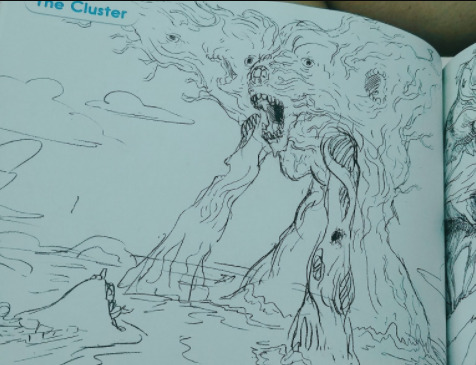
*And let’s not forget the Cluster (because of the rebellion)
So yeah, quite a lot actually. Now you might be thinking, “But Monkey Network, what does those five old men have to do with what the Diamonds did?” Well, when you see the villainous shit the Gorosei have commanded, their actions are actually more relatable.
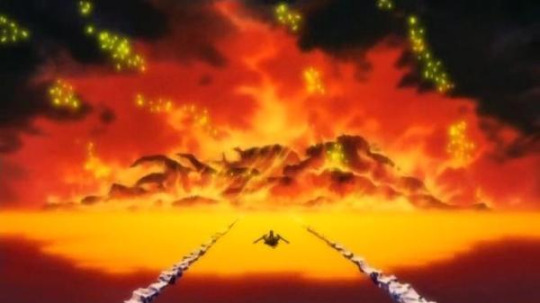
*Ordering the destruction of an island of archaeologists because they were secretly researching forbidden history
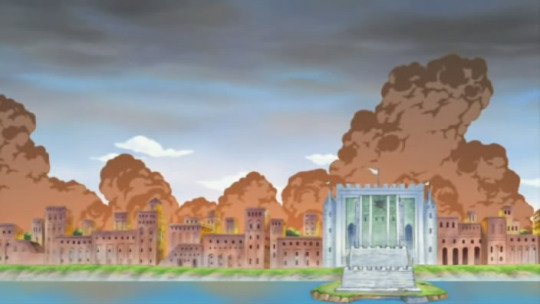
*Allowing a hit on their own government affiliated island to erase any potential surviving threats that invaded there
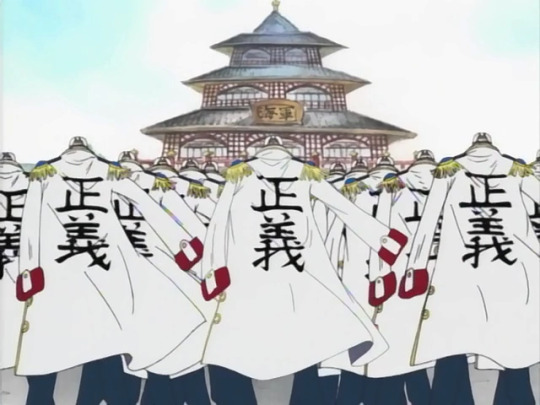
*Directing the Marines, or the front line enemies of our Pirate heroes
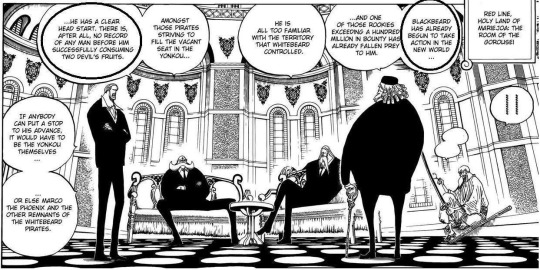
*And contemplating their system’s next move when updates arrive
Now I don’t know about you, but these gentlemen make up quite an authoritative class with understandable motives and relatable notions on running the world without necessarily being on the front lines. Kinda like the US over the years? Even when their level of corruption can be on par and we still know little of their true power and who they really are, they’re instantly better than the Diamond Authority because we can see why they’re in command, their thoughts and actions towards our heroes shows no sign of being sympathetic, and yet we see where their motives lie. I mean, their Government’s enemies are pirates. You know, Pirates? People who’ve robbed and killed and are the opposite of order? See where I’m going here? They namely go after our heroes who are seen to be the enemy even when the Pirates and plenty others consider them the enemy. It’s almost as if there’s a grey choice for the audience to wonder whom the real bad guys are. OooooOOh.
Also, quick side note. The Gorosei look fucking cool. Like their designs aren’t exactly human, credit towards Eiichiro Oda and his expressive designs, but they’re drawn with such a level of seriousness and stature that it presents their elder wisdom and grave subtlety towards a subject in a contrasting light to the pirates bombastic, emotional appeal. But the Diamonds?
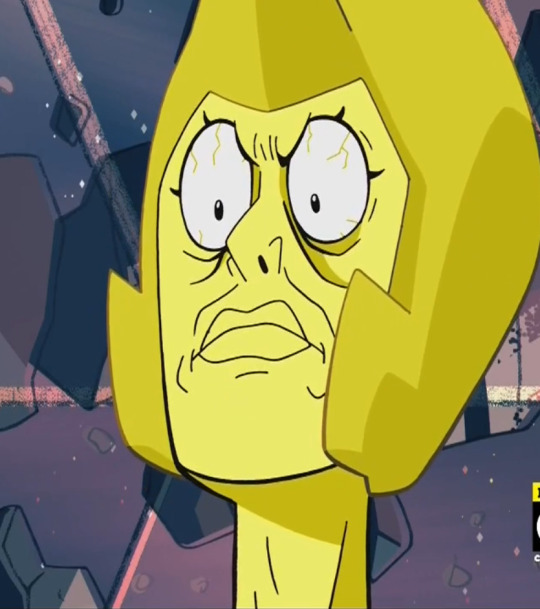
This picture summarizes how I will never take them seriously, no matter how hard they try or how good Patti LuPone is
So, what has this amounted to? Basically, Rebecca Sugardop has given us nonthreatening villains that showed no sign of any redeemable qualities beyond their ability to mesmerize us with their acting. That and give us an episode that, in summary, tells the audience that killing an enemy like the Diamonds makes you no better than them. Yeah, I have to go there.
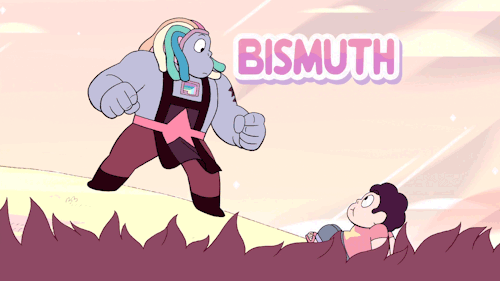
I’ll try and make this quick.
This episode was Crime and Punishment done bad. For Crime and Punishment, it was an old Russian tale of a man killing a woman that’s rich yet unliked in the community because he believed it was for a greater good; implying that murder is permissible in pursuit of a higher purpose. Same can apply to Bismuth, having faith that in killing the Diamonds, Homeworld can be liberated from the oppressive elite. Here’s where that tie-in ends: the effect. In Crime and Punishment, the killer shows sincere regret towards his actions because it didn’t present any change in the community beyond the fact that an old woman got murdered and the only thing the she was despised for was being a greedy pawnbroker. What regret would’ve there been in using the Breaking Point on the Diamonds? Bismuth wasn’t set on killing any Homeworld gem around, just the leader who show that they mean and will mean business unless they’re fully out of commission. The show wanted to say killing the Diamonds is bad even when the effect of it could be good, but never offered any other method to success and just shunned Bismuth to dormancy until they need her again, proving she might have been onto something.
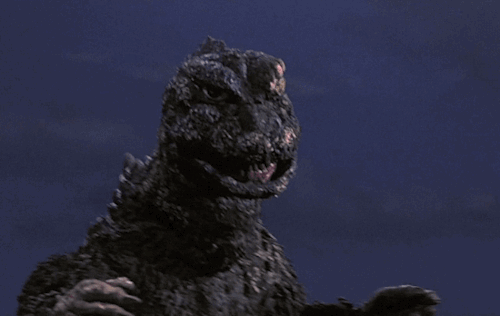
Whew. So, what’s the tl;dr aspect of this since you probably won’t take this seriously. Well, call this a domino effect. Rebecca Sugar Pop is trying to make sympathetic dictators, which is itself an oxymoronic detail. In doing so, she failed to make them real villains. In doing that, there really are no real villains in the show. And when there are no villains, the conflict feels dry and absent. And without conflict, she failed at putting together HALF an overall story. And when you’re a coming of age story where it has to end on some note with maturity and change, after almost five years in the making, you just FUCKED yourself over when you didn’t even invest time in HALF of what makes an overall story of good and evil investing and engaging. Oh I’m sorry, what makes an overall story of a blurred line between good and evil. Investing and engaging.
I can’t care anymore. If they get redeemed, sure. If they end up dying like a tragedy, fine. They feel less like villains to overcome and more like stairs Steven has to step on to become a better person. Just let White Diamond be as grandiose and badass as Tumblr’s AUs of her, because again...
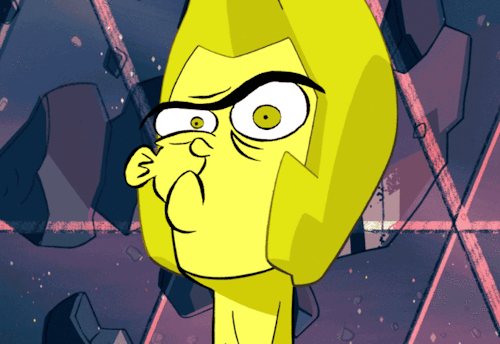
The fandom is doing the show a bit of justice
#steven universe#su#su critical#su criticism#su critique#villains#Bismuth#One Piece#Gorosei#anime#cartoons#reviews#su gifs#analysis#Good Stuff#Roy Macintosh#ye#awesome
309 notes
·
View notes
Text
I wrote that Steven Universe-The Simpsons comparison with the decision to not mention the colonial angle. But it’s become difficult to read posts, some critical, some not, relating to any of the Earth-made gems and spot the same indifference that’s interwoven with my life as Indo. Hopefully this post educates a little on what it means (or can mean; I only speak for myself) to be caught in-between. I normally couldn’t care less, but in this one case, don’t interact if anti-crit or non-crit.
The don’t-think-this-is-all short of the Indo experience is that the Dutch way back figured it’d be nifty if the Dutch East Indies had a supply of loyal people with a reason to stay right where they are. Marriages between Dutch men and Indonesian women were motivated in order to produce a new identity of people that’d be invested in serving the DEI because that, the colony holding both roots, was their home. The duality of being Indo plays a role to this day, past the violence of 1940-1949, the unwelcome by the Netherlands to which the arrival of Indos (and Moluccans) was inconvenient as well as never supposed to happen, and the undealt-with trauma that followed when quietly adapting was all there was to do. I’m not going into detail, but for me, having been born decades after the end of the DEI, I miss the place. Rationally and morally that’s ridiculous, but emotionally it promises so many answers I’ll never get. A lot of my life perspectives are based on considerations of what being in-between means. And though I love the Netherlands dearly (culturally), being part Asian also makes me different and alerts me of just how much my country still hasn’t given its DEI history a place.
So, for me the theme of home in colonial and war context is big and SU lines that stand out to me include “I never asked for it to be this way. I never asked to be made!”, “I don't have memories of it, just feelings. I know I can never go back to Homeworld, but it's hard not to have some feelings for where you came from.”, “I've been fighting from the second I broke free of the Earth's crust, because of what YOU did to my colony! Because of what YOU did to my planet!”, “Who knows what they would do to me back home after what I did to Jasper? I can't go back to Homeworld and I can't stay here.” I’m going to go ahead requesting that if the urge comes to throw a “you’re projecting”, don’t, because odds are I know better just how much SU fails at all of this. These quotes are just a selection reminding what the show could've been and that the writers do have an understanding of what they’re pretending to dig into before disingenuously scrambling back to the Status Quo of everybody getting along because nothing has meaning. I could’ve done without them shoving that nonsense out to a worldwide audience.
With “On the Run”, I don’t see a tale of “just” abuse as I get the impression generally is interpreted. What I see is a child stolen from her destroyed heritage who is given nothing to cope with that and forge herself a new identity. The happy resolution of what Pearl in particular has done to her isn’t giving her better access to the story she belongs to, but eradicating her psychological ties to it. Like, I know what it’s like to have to think about this stuff and I can’t imagine external judgement and disassociation would’ve helped me figure things out. And that would've come from my own parent, not an ugly outsider like Pearl, let alone an outsider responsible for the loss. That’s the bizarre part of “On the Run”. It knows there’s an inherent attachment difference between Amethyst and Pearl, but it lies around it because otherwise Pearl can’t be easily forgiven. The rebellion was right, of course, but sometimes in doing the right thing you can’t avoid causing harm and your moral compass is still on display in how you deal with the aftermath of your actions. Although it is insult to injury to me that RPG are conditional freedom fighters. Each one of them was ultimately motivated by own gain. Ruby and Sapphire wanted each other, Pearl wanted Rose, and Rose wanted human men. This isn’t something I fault them for, but it’d be nice if the show was honest about it and acknowledged the current passivity. The only original CG who is pure and operates by ideology and who could’ve pulled off shutting out Amethyst’s ordeal while still not being insensitive is Bismuth. Instead, she gave Amethyst a kind of support Amethyst usually only gives, never receives. She even shared a non-judgy detail what amethysts are like, which we’ve never seen RPG do! How come Bismuth is the one whom we’re supposed to believe is bad?
Where Amethyst has meaning to me in direct likeness, Jasper is a bit more complex, falling into my sympathy through my grandfather and the (violence-induced) personality traits that have been passed on, being mine and also not. Notwithstanding what I judge, I cannot disapprove of Jasper on the whole. I’ve grown up knowing of a man who was overly dedicated to his role as soldier, who couldn’t keep his home, whose successes were of lesser meaning than his non-whiteness, and who in response only became more dedicated. Pride’s funny like that. I’m not against NPD and child soldier interpretations for Jasper, though I don’t share them, but I experience frustration that the nature of her existence in relation to her uncomfortable place in society is not picked up on as a possibility too. I wondered for a while why Lapis’s lack of (consistent) characterization does not stop peeps from acknowledging the potential she has (had) while Jasper gets more of a “either/or” treatment, until I realized that with Lapis too the home angle barely gets talked about. Ditto for Peridot; my main problem with her redemption is that it wasn’t completed. We only got to see how she came to love Earth, not how she disconnected from Homeworld. I’ve only twice seen a post bring that up. Same disregard is reason #~4 I’m not dealing with HBA fans anymore.
I dislike posts that suggest Amethyst owes RPG anything. I dislike posts that pose that Amethyst feels impure for not being a CG by choice. I dislike posts that place Amethyst and Jasper on incompatible ends as if they’re not different expressions of the same duality conflict. I do not tell what to ship or not, but from the above it should be clear that I hold a negative opinion of ships involving any member of the Famethyst with anyone who has proven not to understand (do the people who ship understand?). A particular thing that’s been on my mind with Jasper and Lapis ever since “a lapis terraforms” is the theory -- a miniscule possibility that makes my hair stand on end -- that Lapis was involved with the creation of Beta. Roughly the only reason I want her arc to continue is to have confirmation that that theory is wrong. It needs to be wrong. And on a final matter, trying to put this as delicately as I can: I hope all who have compared Homeworld to Nazi Germany come from a place where they own those words. Because there’s a distinct lack of other (and at times more fitting) comparisons. Like, I’ve only ever seen one person compare Homeworld’s deal to the invasion of the Americas and nothing on any other. Just in general, I’m not comfortable with understanding evil only as an externalized condition.
If possible, I’d like to see some more consideration whenever an Earth-made gem is the topic. A loss like theirs is a bad one, and even if you’d argue SU deals with it horribly in a way that can be ignored, both Amethyst and Jasper have made references to their troubles as a result of the loss. I may as well add, to any (future) writers, a piece of advice. When your worldbuilding requires you to create societal details, keep in mind that life’s stranger than fiction and nothing you can come up with doesn’t have a real-life parallel, sometimes with memory still fresh (there’s nothing colonial in SU that’s new to me) or even ongoing. It’s pointless to tell you to educate yourself because you can’t always do that if you don’t know what to look for (and as I can attest, even with a lead it can be difficult), but you can always be a decent person about what you try to do. If you decide on certain themes, carry them full and sincere instead of suddenly hiding behind claims of intentional naivity. It’s not difficult to think of how a certain event ought to affect each character and either reject the event if it gets in the way of the goal or plan for the outcome.
To end on a constructive note, these are specific things I would’ve liked SU to do instead:
Be clear about the place of imperfect gems in society, including the occurence of beta productions. We’ve got, like, five random sources right now and they’re contradicting and vague at best.
Be clear whether Rose (and any others of the pink court) is from Earth or not. It matters.
It creeps me out how the show refuses to decide whether Amethyst is an adult or a child and pretty much lets it depend on whether it wants Steven alone or not. Especially creepy given that Amethyst is stolen while Steven is the grand heir.
Be thorough on gem names. I never thought that moment where Peridot calls herself “Peridot” instead of her code was a moment for her, because in order to be “Peridot”, no other peridots may be around. No other peridots may share in what she has. That’s not “d’awww!”, that’s horrible. It bugs me with the Ruby Squad that we know them only by names Steven’s given them and I don’t get why we haven’t got a gem yet who chose their own name as a way to reject Homeworld’s identity rules. Only Amethyst’s scene of discovering her code made sense. (Needless to say, this non-commitment to name significance is why the DeMayo/Universe and Steven/Nora deals are laughable at best.)
Any plot necessity for Steven and Amethyst not to ask questions is dealt with by focussing on why they don’t ask questions. Fear of what emotions they might unleash? Fear of conflict between the teller and the not-teller? Fear of losing certainties? Fear of being unable to handle the answer? Fear of having to ask more questions? Or maybe they know the answers they need but not the questions to get at them. Stuff like this is like a sudoku; you have some answers and you know there’s more, but you can’t formulate a means to get those answers without finding the starter points first.
Garnet would’ve never said “For Amethyst to be herself“ in “Bubbled”, because, holy heckles, that’s rich coming from Ms. “We kept Amethyst”.
Going back to “Stronger Than You” after “Earthlings” leaves me with distaste. Jasper vaguely seems to respond to “And I won’t let you hurt my planet!”, a line that ought to hurt and infuriate her from what we know now, but it’s barely noticeable and gets contextually hidden by a closeup slasher smile. Either [my planet] should not be there or Jasper’s response should get focus. Yes, it’s Garnet’s song, but you can’t play over this like that. (I despise how the crewniverse hid an ethnicity context behind a sexuality one.)
Malachite would’ve gotten Sugilite’s deal (and Sugilite something much better). Lapis would’ve fused with the aim to trap the fusion and give the CGs a clean shot, having nothing better to hope for than that Steven would save her from whatever fate would be Jasper’s. But the unexpected happens when the two fuse, Lapis’s knowledge that this one act locks her from her home for good and Jasper’s resurfaced trauma of the loss of her home mixing into a singlemindedness neither could’ve foreseen or can control. Malachite would’ve escaped and periodically resurfaced as a break from the Cluster plotline and something fresh in the gem recovery narrative.
The moment Peridot brings up the plans for the Earth colony in "It Could've Been Great", Amethyst would not respond identical to Garnet and Pearl, but rather with a hint of wonder. She was made for it and it was supposed to be made for her; shameful but her story nonetheless. Peridot becomes the person she tries to get more information from what happened and what things could’ve been like after all this time of RPG proving untrustworthy. That ableist nonsense of “Beta” does not occur.
Amethyst and Jasper “bond” after one or the other figures out the other’s identity, if only by playing into Jasper’s anger. Amethyst later defects (though never betrays), resulting in her own time of learning on HW and later visiting/being sent to the pink station, where her story can overlap with whatever is the equivalent of the abduction arc. Consequences of Amethyst leaving are progress in Garnet’s growth into leadership, major self-reflection by Pearl, probs something like Peridot boosting the ranks (Lapis and Bismuth deserve time to themselves), and, since I want Amethyst and Lars to be BFFs over Purple Puma, for this to be a hit on Lars that later helps Amethyst understand RPG’s choices and for which she’d apologize/make up in the equivalent of “Wanted” or thereafter. It could probably also be incorporated in Lars reflecting on his lost friendship with Ronaldo and the choices he made there.
I’m not sure what I want for Jasper. Her getting corrupted is fine by me, especially if she’d be crucial in developing a healing process, but I really wish SU had handled corruption better. Finding peace with her peers would be nice. I’d also like her being able to empathize with HBA (while not tolerating her actions) in a “I’m not where I’m supposed to be and neither are you” sense.
SU avoids talking about it, but it stands to reason some of HW’s planets were populated. You don’t have an army if you don’t have wars. It’s been my interpretation for a long time that Yellowtail is fully alien, Vidalia possibly part alien, and Onion at least half alien, all survivors or descendents thereof from another colonized planet. And after that odd scene between Topaz and Onion, I like to think Topaz is from that colony and that her encounter on Earth makes her think and spread the anti-colonialism beyond Earth.
17 notes
·
View notes
Text
Secret Empire #0 Thoughts (Spoilers)
Previously: The Red Skull used Korbik (a sentient cosmic cube that sometimes takes a child's form) to turn Captain America into a bad guy. Captain America is now a loyal agent of Hydra an evil organization that is sometimes Nazi affiliated and sometimes not depending on who is writing. Captain America planned a bunch of bad stuff behind everyone's back. Captain America turned on his evil master. Red Skull desperate to make Cap stop admitted that Captain America that his new history (that we saw in extensive flashbacks over many issues) was all lies he made up. Captain America doesn't care because he's EEEEVIL! He kills Red Skull and sets out to take over the world... his way! This took 15 fricking issues to get to. Meanwhile we learned that Nick Spencer should really stay off twitter.
Notes: Despite the bad reaction Spencer's Cap run has gotten I'm actually a fan of most of Nick Spencer's work. Superior Foes of Spider-Man is of one the best comics of the last decade and the The Fix is hilarious. His run on the two Captain America runs are really mixed bags. The first two arcs of “Captain America: Sam Wilson” are really good but Spencer struggled trying to deal with real life politics in the later issues. As for the eeeeeevil Captain America book well... it's better than painful fever dream of Rick Remender's Captain America book. I'm going to try to be fair and optimistic going into this one.
Our story opens with a World War II flashback in of Hydra Cap in the mountains of Japan meeting with Kraken an obscure villain from Jonathan Hickman's Secret Warriors. Hydra's secret base looks like the Legends of the Hidden Temple set. Kraken tells Captain America that the Allie will use the Cosmic Cube (not Korbik but another one) to change reality so that Hydra doesn't take over the world. He says they're going to change his memories and no matter what he must not forget he's a Hydra Agent. Of course we know all of these new World War II memories are bullshit so... they're either illusions or maybe Kraken was manipulating Steve the whole time or... uuuugh. I am three pages in and I have a headache!
We now have a flow chart of characters. I know Secret War did the same thing but... hoo-boy. That's a bad sign.
We cut to modern day. Cap is at S.H.I.E.L.D command with Sharon Carter. We learn that a Chitari (those aliens from the first Avengers movie) invasion is headed towards Earth. But the Planetary Defense shield is down. Wasn't there a whole other organization called S.W.O.R.D that handled this? Where is Abigail Brand?
We see the Guardians of the Galaxy and The Ultimates fighting aliens in space. I am wondering why most of the focus isn't on this and is instead on S.H.I.E.L.D HQ? Daniel Acuña draws pretty fight scenes. Let him do that!
Meanwhile a boatload of supervillians lead by Gravitron are attacking New York and the Defenders are fighting them. Unfortunately more of the focus is on S.H.I.E.L.D headquarters. So we’re mostly watching EVIL Cap and Sharon watching all the action.
Meanwhile Hydra has invaded the country of Sokovia the country that Ultron completely destroyed back in Kurt Busiek's run. I know it’s played a role in Specer’s run but shouldn't it just be all empty space and dead Ultron drones now?
The narrator is REALLY going out of his way to tell us what a brilliant strategist Hydra Cap is and how all of these couldn't have happened by coincidence. It's sort of like how every three pages in Avengers Arena someone says “gee Arcade is really a clever villain now. He sure thought of everything.”
Back in space Quasar is eaten by a space whale. I should be upset at the apparent death of a new superhero but like... this HAS to be a set-up for her to punch her way out of the belly of a space whale an issue or two later. Right? I mean why would you waste an opportunity for an awesome action scene?
I just realized that Hydra Cap planning his scheme while the heavy hitters are in space is a LOT like the plot of Infinity. Also the whole novelty of an EVIL Captain America story would have been a lot more at home in Axis. Remember how Tony Stark was eeeeeevil for a year and no one cared?
Now Nitro shows up while the Defenders are fighting and Jessica Jones throws him high into the air while he triggers an explosion that looks like a homage to the opening of Civil War. This comic is turning into a greatest hits album of other comic crossovers.
The Secretary of Defense gives Captain America full control over the U.S. Military and Law Enforcement thanks to a new act of congress so everything bad from here on out is caused by an ill conceived piece of legislation... just like Civil War!
The defense shield is turned on locking aliens out and the Defenders get backup from the Uncanny Avengers. Things are looking up for the heroes.
Suddenly a heli-carrier crashes into S.H.I.E.L.D HQ and a bunch Hydra mooks show up. Only the S.H.I.E.L.D guards aren't fighting back because Dr Faustus is brainwashing everyone. I should have mentioned before this whole mess started that the Red Skull had psychic mindscrew powers and dude whose sole power was brainwashing people working for him. If you really wanted to do a Captain America is EVIL story the whole cosmic cube and prolonged elaborate false history flashbacks are kind of superfluous.
Captain America orders the Hydra Guards and the mind controlled S.H.I.E.L.D guys to take Sharon Carter prisoner. Sharon is not under Faustus' control despite the fact that if I had a drink for the number of stories where Sharon Carter was mind controlled I'd be drunk. Sharon thinks Cap is being controlled by Faustus but...
youtube
A Hydra guy is just standing there and has this slackjawed look like “I can't believe this shit.” I'm going to pretend he's Bob from Deadpool. Bob's presence is the most entertaining thing about this book so far.
I could be reading “The Button” right now. That comic has Batman fighting Professor Zoom AND Flash fighting Samurai Robots... Samurai Robots! And it doesn't have walls and walls of exposition text...
Iron Men Riri Williams and Force Ghost Tony Stark (it's a long story) discover someone has sabotaged the planetary defense shield and Hydra guys attack them. Just as it looks like we're going to get a good fight it cuts away.
On Space Skype Captain America reveals to Captain Marvel that wave after wave of Chitari are coming and he's keeping them walled off outside with fierce alien warriors to their doom. Cue Cliffhanger #1.
Tony Stark and Riri Williams just beat up all the Hydra Guys OFF CAMERA! We've got like a bazillion action scenes going on and NONE of them are given any time to breath under these unending walls of exposition text.
Hey it's HELMUT ZEMO! Which Zemo is it... the morally complex anti-villian/anti-hero from Thunderbolts? Is it the Cobra Commander-esc idiot from Avengers Undercover? A combination of the two? I don't know because he has all of three panels in this issue.
Zemo and a guy named Blackout (not the Ghost Rider Villian) have stolen the book of Darkhold. Does anyone remember Darkhold: Pages from the Book of Sins? It was like this early 90s quasi-horror comic about this cursed book whose pages granted evil monkey paw wishes and the people who made those wishes usually turned into monsters. Plus there was an evil dwarf. Like that you should be revamping that into something so if you wanted Peter Dinklage to be a villain in a Marvel movie. Oh and there were people called The Darkhold Redeemers who were trying to stop the Dwarf and one of them was a lesbian and this was like long before LGTB representation was anywhere near common in comics. Dude I want a Darkhold Redeemers comic.
So Zemo and an obscure Avengers villian named Blackout (who looks like the poor man's Electro) use the Darkhold to banish New York City isolating it under a Dark Force dimension dome. It's like when the Hand sealed off Hell's Kitchen in Shadowland but bigger. ANOTHER crossover callback. Cliffhanger #2.
Tony deducts that the next target of attack is going to be Washington DC he calls for The Avengers (several teams worth), The Champions, and Spider-Man (who I guess wasn't in New York.) We get some big epic hero arrival poses that would look great if they weren't crammed into TINY... TINY panels.
Back in Washington an army of Hydra Helicarriers loom ominously over the White House. Hey do you remember the C-Plot from Fear Itself. When Skadi's Army attacked Washington but no-one cared because the rest of the book was about fighting monsters with Evil Thor Hammers? ANOTHER CALLBACK!
This the B-side of a Marvel Comics Crossovers Greatest Hits Album. Side A is about 70% tracks from Secret War, the Worthy stuff from Fear Itself and a trio of tracks from Civil War, Secret Invasion, and House of M. that were popular at the time but doesn't hold up.
The nicest thing I can say about this comic is that Daniel Acuña's art is really good and if anything this is one of the best looking bad comics I've ever read.
Despite the involvement of Hydra and the 40s flashback EVIL Cap doesn't really come across as a Nazi at all and just a generic “take over the world” badguy. On one hand that kind of seems to be Marvel backing away from the obvious “Cap is a Nazi” angle that was making people uncomfortable and angry and yet on the other hand it's also backing away from the “America is more messed up than we thought” allegory that could actually make a point this time. Spencer isn't the guy to be doing that kind of project though. Not sure who I could see doing that and making such a gut punch work. Grant Morrison or Kyle Baker maybe?
If this is any indication it's going to be a loooooong six months. Maybe I should be polishing off my “Rikki Barnes: The Winter Soldier” pitch.
#Secret Empire#Marvel Comics#Captain America#HydraCap#Nick Spencer#Daniel Acuna#Every Crossover Ever#This Comic Is Bad And You Should Feel Bad#Spoilers#Wednesday Spoilers
76 notes
·
View notes